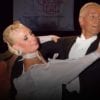A new study in Scientific Reports found that merely listening to music that makes you want to dance can support your most basic mental processes and their associated brain activity.
It was admittedly a small study, but backs up other studies showing that dance improves your cognitive ability.
We already know that moving the body to music is a universal phenomenon. It’s also been confirmed through other studies that groove music improves the gait performance in Parkinson’s disease by reducing the cognitive demands of synchronizing body actions with the brain. While most people don’t have enough knowledge to do much more than sway their body, tap their feet or move their arms, dancers are fully tuned into the potential of moving to music. Thus, groove music can have even more of an impact on trained dancers.
The team of Japanese researchers focused on “music that elicits a sensation of groove,” which the study describes as songs that make you “want to move to the music.” According to the study, “listening to groove music induces entrainment of body movement and musical rhythm together with positive affective responses and activates neural networks associated with motor and reward systems.” The researchers believed that, since the dopaminergic reward system projects not only to emotion-related brain areas but also to cognition-related areas such as the PFC, groove music might also enhance cognitive function. However, no research had explored the effect of groove music on EF and prefrontal activity to date.
To test the effect of groove music on cognition, the researchers gathered a group of young adults and measured the activity in their brains’ dorsolateral prefrontal cortex (l-DLPFC), which is associated with executive function. Researchers measured the brain activity in participants while they listened to three minutes of groove music or three minutes of a white noise metronome. Participants were then tested to measure brain responses.
“The results were surprising,” said lead author Hideaki Soya, Ph.D., in a media release. “We found that groove rhythm enhanced executive function and activity in the l-DLPFC only in participants who reported that the music elicited a strong groove sensation and the sensation of being clear-headed.”
The researchers noted that this study also adds to the evidence that listening to a favorite song is good for the brain. In contrast, those who didn’t feel a groove and were unfamiliar with the song experienced no effect (and in some cases even a negative effect) on their brain activity and test performance.
“Our findings indicate that individual differences in psychological responses to groove music modulate the corresponding effects on executive function,” Soya said. “As such, the effects of groove rhythm on human cognitive performance may be influenced by familiarity or beat processing ability.”
So, now we have scientific evidence that listening to music that makes you want to dance can improve your cognitive abilities. More research needs to be done to confirm these findings, but this is a start. So get out onto the dance floor and get groovin to the beat!














